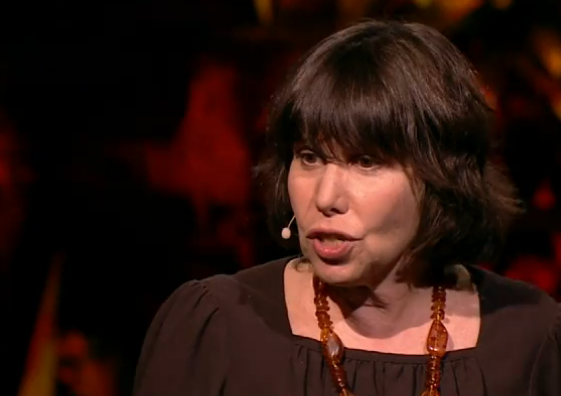So the question is: What would the baby give her, what they liked or what she liked?
但大家都想知道:宝宝会给她什么,是贝蒂喜欢的还是自己喜欢的?
And the remarkable thing was that 18 month-old babies, just barely walking and talking, would give her the crackers if she liked the crackers,
让人惊讶的是18岁大的宝宝,虽然还没有开始走路和说话,给了贝蒂饼干如果她喜欢饼干,
but they would give her the broccoli if she liked the broccoli.
但给了她花椰菜如果她喜欢的是花椰菜。
On the other hand, 15 month-olds would stare at her for a long time if she acted as if she liked the broccoli, like they couldn't figure this out.
另一方面,15岁大的宝宝会望着贝蒂,如果她说自己喜欢花椰菜,宝宝们还是不知道。
But then after they stared for a long time, they would just give her the crackers, what they thought everybody must like.
但在观察了一段时间之后,他们给了贝蒂饼干,因为觉得所有人都会喜欢,
So there are two really remarkable things about this.
所以这项实验有两个值得关注的发现。
The first one is that these little 18 month-old babies have already discovered this really profound fact about human nature, that we don't always want the same thing.
首先是这些18个月大的孩子已经开始注意一个人性的奥秘,那就是我们想要的东西不同。
And what's more, they felt that they should actually do things to help other people get what they wanted.
还有,他们意识到自己应该做点帮助他人达成愿望的事。
Even more remarkably though, the fact that 15 month-olds didn't do this suggests that
但更让人值得关注的是,15个月大的宝宝们没有这种意识
these 18 month-olds had learned this deep, profound fact about human nature in the three months from when they were 15 months old.
说明18月大的懂得了一个人性的奥秘,而当他们3个月前还没有意识到。

So children both know more and learn more than we ever would have thought.
所以宝宝们知道的和学到的比我们想象中要多得多。
And this is just one of hundreds and hundreds of studies over the last 20 years that's actually demonstrated it.
而只是在过去20年里的上百项调查的其中之一证明了这个观点。
The question you might ask though is: Why do children learn so much?
但是你也许想要问:小孩子为什么学到这么多呢?
And how is it possible for them to learn so much in such a short time?
在这么短的时间里,他们怎么能办得到呢?
I mean, after all, if you look at babies superficially, they seem pretty useless.
我是说,如果你只从表面来观察这些宝宝,他们似乎没什么用。
And actually in many ways, they're worse than useless, because we have to put so much time and energy into just keeping them alive.
事实上在很多方面,他们比没用还没用。因为我们需要花如此多的时间和经历才能让他们生存。
But if we turn to evolution for an answer to this puzzle of why we spend so much time taking care of useless babies, it turns out that there's actually an answer.
如果我们从进化的角度来寻找,我们为什么要花这么多时间来照料这些没用的宝宝们的答案时,我们找到了一个答案。
If we look across many, many different species of animals, not just us primates, but also including other mammals, birds, even marsupials like kangaroos and wombats,
如果我们观察各种不同种类的动物,不光是灵长类,包括其它哺乳动物和鸟类,还有有袋目哺乳动物,比如像袋鼠和袋熊,
it turns out that there's a relationship between how long a childhood a species has and how big their brains are compared to their bodies and how smart and flexible they are.
结果是,动物的孩童时期长度和它们的脑部大小与身体的比例,还有它们的智慧和灵敏是存在关系的。











